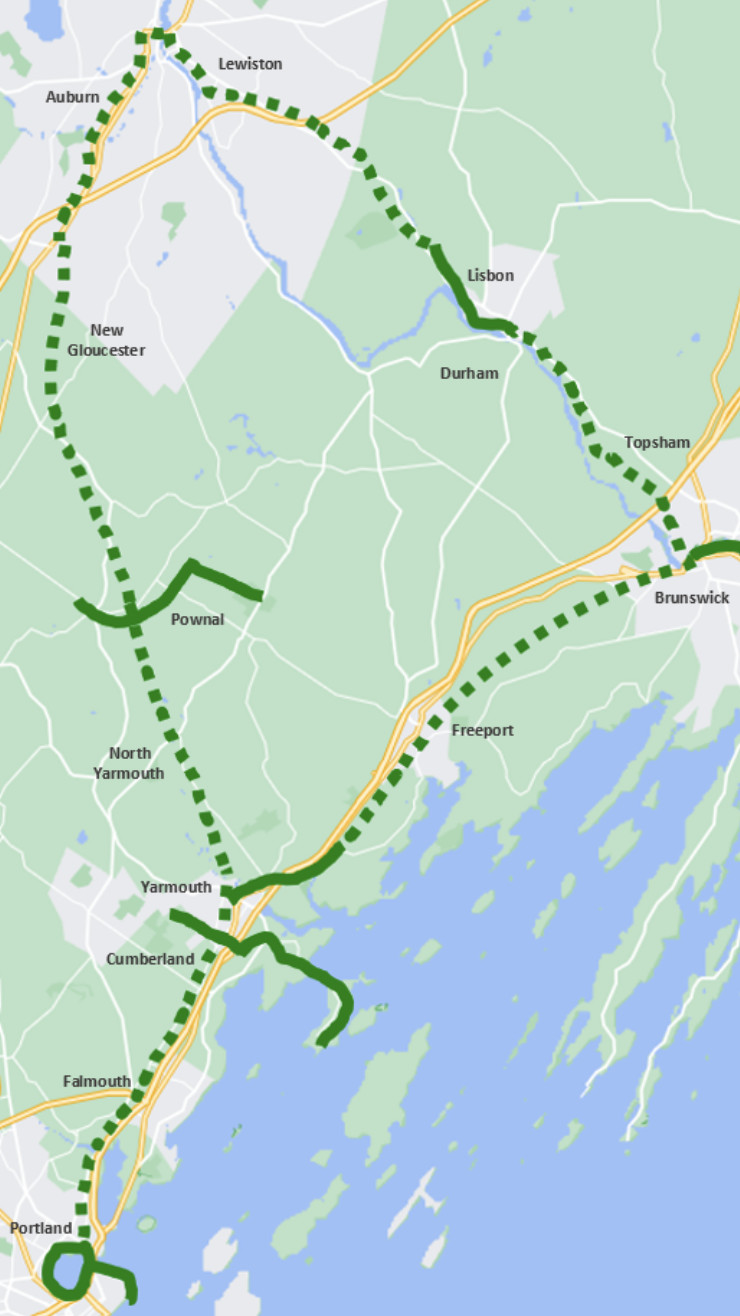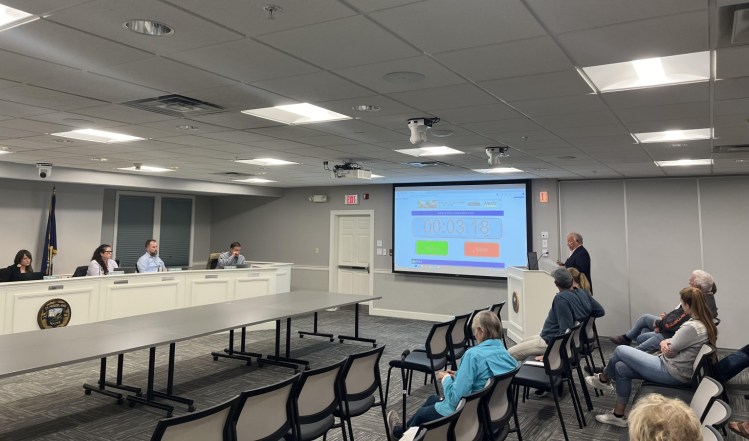
The proposed Casco Bay Trail runs from Portland to Lewiston-Auburn, making a loop that passes through multiple municipalities, including Cumberland. Contributed / Casco Bay Trail Alliance
The Casco Bay Trail Alliance – the group spearheading the creation of a 72-mile bike and pedestrian path that would run from Portland to Lewiston/Auburn and back down again in a loop – encountered a setback last month when Cumberland postponed giving its blessing to a 25.6-mile portion of the trail, 2.6 miles of which run through Cumberland.
On Sept. 20, the Casco Bay Trail Alliance and seven other Portland-based groups sent a letter to the city’s Sustainability and Transportation Committee asking for the city to pass a resolution in support of the trail. The organizations argue that the trail would enhance transportation infrastructure and reduce reliance on cars.
Under the proposed plan, the 25.6-mile state-owned portion of the Berlin Subdivision rail corridor would be converted into a trail and serve as the backbone of the Casco Bay Trail. Previously owned and operated by the St. Lawrence and Atlantic Railroad, the Berlin Subdivision runs from Portland to Auburn and is inactive. It is now owned by the Maine Department of Transportation.
Under state law, the Maine DOT must get consent from Legislature for the rail to be used for some other purpose. The Casco Bay Trail Alliance wants towns along the route to sign off in support to increase the chances of approval in Legislature, according to Ed Suslovic, a board member of the Casco Bay Trail Alliance.
The group hopes the trail plan will be approved this legislative session, in part because of a $30 million bond issue for trail construction that Maine voters will decide on in November. If approved, a portion of the bond funds could be used to convert the rail lines into the Casco Bay Trail, according to Suslovic. Following the bond’s approval, it would provide $30 million of competitive grant funding to towns, organizations and clubs over four years. Of the bonded amount, $15 million would go toward constructing and maintaining multi-use trails, for which the Casco Bay Trail would qualify.
“We’re asking the Portland City Council to pass the resolution that informs the Legislature and that Portland joins the other communities … that have already passed resolutions supporting the trail,” he said.
If the Portland City Council were to pass a resolution in support of the plan, it would join municipalities such as Falmouth and Yarmouth, which have already done so.
“Portland being such a big player in the state, being at the end of this line, or the beginning of the line, depending on how you view it, and with the relationship with Lewiston/Auburn, the second largest community in the state, that active transportation corridor could be a real leadership moment for the city,” said Jon Kachmar, executive director of Portland Trails, one of the groups that signed on to the letter.
“But they need to indicate that publicly, and they need to have the Maine Department of Transportation know that that’s happened. It’s really what’s holding up any further progress on moving forward with it,” he said.
Casco Bay Trail Alliance hopes the Portland City Council will pass a resolution in support of the trail in the next month, said Suslovic.
Ultimately the Cumberland Town Council voted 6-1 on Sept. 23 to postpone a decision on the resolution pending a neighborhood meeting with abutters who live along the trail route and the Maine DOT. As of Oct. 1, the meeting had not been scheduled yet, according to the town.

Tony Donovan of the Maine Rail Transit Coalition spoke at the Cumberland Town Council meeting on Sept. 23. Eloise Goldsmith / The Forecaster
“The issue is people walking back and forth all day long, right outside of their back windows, and the potential for serious consequences coming off that trail,” said Councilor Michael Edes, summarizing the sentiment of concerned abutters.
Joe Kumiszcza, a resident on Middle Road, told the council during the public comment period of the meeting that he opposes the trail, arguing that it would bring too many people close to his home through Cumberland each day and would reduce property values.
“I don’t think you’ll find a similar trail that hasn’t generated a significant increase in unlawful campsites, property damage and physical assaults,” he said.
That hasn’t been the case on at least one other popular southern Maine trail. The Eastern Trail, a pedestrian and bike trail that starts in Kittery and ends in South Portland, generates little crime, according to two deputy chiefs of police that The Forecaster spoke with.
“I can’t even think of the last time we went out there,” said Deputy Chief Eric O’Brien at the Kennebunk Police Department. Saco Deputy Chief Steve Gorton said that his force has issued trespass warnings to a small number of unhoused people camping along the Eastern Trail (the Eastern Trail is private property) who then left. As a general matter the trail has not generated crime in Saco, he said.
Kumiszcza also took issue with the Portland to Auburn Rail Use Advisory Council, which conducted a nine-month review process starting in 2022 to make recommendations to Maine DOT about what to do with the Berlin Subdivision rail corridor.
Seven out of 15 members of Rail Use Advisory Council voted to recommend converting the rail into an “interim” pedestrian and biking trail – the proposal the Casco Bay Trail Alliance is asking municipalities to sign on to – and five out of the 15 voted to preserve the tracks and construct a parallel multi-use trail beside it. A single member voted to keep the rail tracks as is. Two members abstained from the vote.
The so-called interim trail option was the least expensive choice, according to the Rail Use Advisory Council.
“Interim” or “trail until rail” means that the tracks would be removed with the understanding that the potential for future rail use is maintained, in adherence with state law.
“Of the 22,000 miles of rail trail in the United States, I think about 12 have been converted back to rail. This tells us two things. One, the rail banking laws work as intended. We can put a rail system back in once the trail has gone in. And two, the trails are so popular that we don’t want or need to put the trains back in,” said Paul Drinan, the active transportation director at the Bicycle Coalition of Maine, in an interview with The Forecaster.
Tony Donovan, a founding member of the Maine Rail Transit Coalition and member of the Rail Use Advisory Council, said he believes the changes would be more irreversible.
“There is no such word as interim. Once this valuable railroad transportation infrastructure is removed, it can never be replaced,” he said.
Running parallel to the Berlin Subdivision between Portland and Lewiston/Auburn is the privately-owned CSX rail line. While no trains on the CSX line carry passengers between Portland and Lewiston/Auburn, the Amtrak Downeaster runs passenger cars on the CSX line between Brunswick and Boston. Proponents of converting the Berlin Subdivision to an interim trail said the CSX line between Portland and Lewiston/Auburn could be converted into a passenger line if there was demand.
Paul Weiss of Blanchard Road said that he is an avid biker but said the existing rail corridor is a precious resource and he does not want Maine to give it up. Weiss is also the director at Maine Rail Transit Coalition. Weiss and Donovan have spoken out against rail conversion in the past.
“We are literally going to be shooting ourselves in the foot in future generations by destroying the future of transportation,” he said.